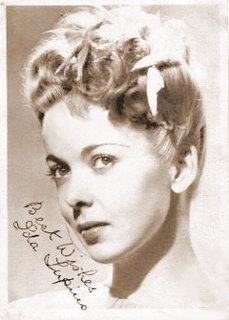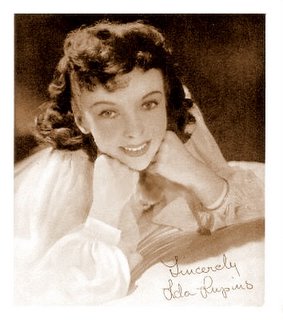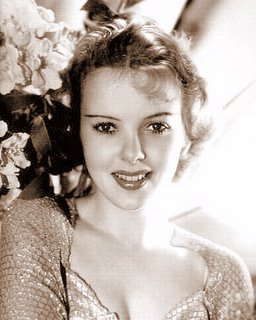Sunday, January 29, 2006




Ida Lupino
Hollywood legend, Ida Lupino, has been considered remarkable and fascinating by your humble moderator ever since he was a little kid. Ida was born in England, and came to America just slightly beyond puberty. Her career in motion pictures ranged from dazzling starlet to respected and venerable director. Her death in 1995 at the age of 77 ended not only a huge show-business career, but an interesting personal life, including marriages to three very interesting men.
As a little boy, I would watch Ida onscreen and her presence evoked great warmth as well as a certain maternal attraction. At the same time, there was this feeling of fearfulness. Later in life, this irony led me to investigate in the attempt to discover, why. The process has produced some curious results.
Ida, the name being shortened from “Aida”, was born into England’s well known Lupino family. Her father, Stanley Lupino, carried on the family profession of performing in Theatre and Music-Halls. The Lupinos had been in England since the 17th century. In other words, they were part of the Anglo-Italian community. This group of people produced some of Britain’s most memorable artists and performers. The Rosetti family was part of this group as well as many musicians ranging from Mantovani to Barbirolli. In most cases, they retained a good deal of ethnic identity, but nonetheless considered themselves truly English. It does well to note that there is a corresponding community of Brits who migrated to sunny Italy just for the love of it. Their adventures are well documented in history and literature.
By the way, yours truly, has been reading “Ida Lupino, A Biography” by William Donati. MuseVision highly recommends this book. It is a good read and is set a good tempo. Every chapter is a treat, and the author gives you the kind of information you will need to “read between the lines”. For example, Ida’s family continually groomed her for a film career starting around the time she got out of diapers. Every step of the way was carefully planned with an almost ruthless logic . Thinking with a practical mind might be another way of describing it. In some ways it will remind you of the way certain musical prodigies were groomed for a concert career. Yehudi Menuhin comes to mind.
Ida’s mother, Connie O’Shea was an outstanding Irish dancer living and working in England. She was known for her energetic performances and her great beauty. Connie came from a long established show-business family, too. Reading between the lines in Donati’s book, one can glean how the O'Sheas and the Lupinos established a “cell” in Hollywood. There was a thriving British cinema community in Hollywood and Ida’s relatives were ready to receive her and Connie when the right time came.
Ida received inspiration and coaching from her Dad, and total physical and emotional sustenance from her Mother. The future star studied at the Royal Academy of Dramatic Arts, but, of course, that plus 50 cents would get you a cup of coffee in Hollywood. Nonetheless, she was able to get important parts in some British films and the stage was set, so to speak, for the larger goal of an American career. Ida was off and running. The reader must keep in mind that she was barely 14 years old when all of this was happening. At a tender age, Ida was taking off for America and so was her Mother, Connie.
She was able to apply talent, beauty, leverage, and just plain luck, to establish herself in the film business. By the time the late Thirties rolled around, Ida was a big star on the Warner Brothers payroll. Jack Warner, who treated people tyrannically, let Ida take roles that Bette Davis refused to play. This meant that Ida usually played “bad girls”, women with unusual situations and/or emotional problems. Great! Some of Ida’s most memorable roles were from this very genre. “High Sierra” opposite Humphrey Bogart is one of her finest hours. It’s heart-rending final scene is emotionally moving almost to distraction. I have re-run it countless times just to watch Ida act out the most tender, grief-stricken emotional abandon.
Jack Warner was proud of that one too, as it put both of the stars careers over the top. Jack Warner had told Ida that she was “not beautiful” Surely he was watching with his eyes closed. To be fair, I suppose he was looking for a different kind of appearance – larger features, perhaps, which would make her look more significant. Ida never thought much of the “beauty” angle, anyway. Her mind was on the craft of film making. It is said she had a huge capacity for learning. She would study every aspect of film making as she worked and she would learn from every technician and director. She used all of this knowledge in her later Directorial career, which produced some good fruit, especially if you are looking for films which depict socially aware subjects. Socially aware for their time, anyway.
It was not my intention to review Mr. Donati’s book as much as to get to the bottom of my “investigation”. However, there is one more thing that could be interesting to a MuseVision reader. Ida was especially fond of classical music. Chopin and Tchaikovsky were her favorite composers. What else? Ida was complex and high-strung and so were these composers. Ida also wrote songs and played the piano. Some of her songs or other music was actually recorded, possible under a pen-name. If anyone knows where MuseVision can find these recordings, please advise your humble moderator.
Ida’s marriages dissolved one by one, each for different reasons. Conversation, wit, and a certain brand of manners were important to her, but as life’s erosion process took place, her relationships would often turn to tirades, arguments and “throwing down the gauntlet”. Ida’s habit of total absorption in her work led to unmanageable insomnia. Although she had more friends that a lottery winner, she became unhappily reclusive in her later years.
It’s time to get back to my original query. Why did Ida Lupino seem so attractive and yet so fearsome. The background of her personality was surely an important part of it. The Italian gift of dedication to craft and originality as well as high artistic standards gave her a “trueness’ that eludes lesser players. This trueness is attractive. The Irish side of her personality, with it’s gift of music and it’s pure unwavering devotion was an undeniable attraction, as well. Add to this mixture her constant English-ness and you may have a portal into the Ida persona. All of these traits combine in her personality along with a flair for romanticism. Her temperamental nature was quite understandable if at the same time uncontrollable. For all her toughness, she seemed vulnerable, too. She was all heart, basically, and people who are all heart have to learn how to defend themselves, odd as that may sound. Ida was often “too hip for the room” and yet at the same time, she was frustrated by the hurdles of the entertainment industry.
These traits created a genuine simpatico in a little boy from the Fifties who found himself growing up in an east coast community dedicated to middle-class rectitude. They say opposites attract. If you are hungry for a screen performance which is both powerful and delightful – even with second rate material, go see an Ida Lupino movie.